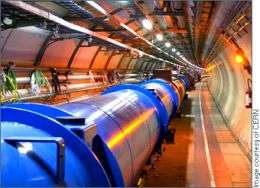Large Hadron Collider preparing 2010 new science restart

At its 153rd session today, the CERN Council heard that the Large Hadron Collider (LHC) ended its first full period of operation in style on Wednesday 16 December. Collisions at 2.36TeV recorded since last weekend have set a new world record and brought to a close a successful first run for the world’s most powerful particle accelerator. The LHC has now been put into standby mode, and will restart in February 2010 following a short technical stop to prepare for higher energy collisions and the start of the main research programme.
Professor Keith Mason, Chief Executive of the Science and Technology Facilities Council (STFC), which funds the UK particle physics programme, including the CERN subscription, said, “The first running period of the LHC has been incredibly successful with many important milestones reached very quickly after restart. We’re looking forward to high energy collisions and some truly groundbreaking science in the New Year.”
The LHC circulated its first beams of 2009 on 20 November, ushering in a remarkably rapid beam-commissioning phase. The first collisions were recorded on 23 November, and a world-record beam energy was established on 30 November. Following those milestones, a systematic phase of LHC commissioning led to an extended data-taking period to provide data for the experiments. Over the last two weeks, the six LHC experiments have recorded over a million particle collisions, which have been distributed smoothly for analysis around the world on the LHC computing grid.
“Council is extremely pleased and impressed by the way the LHC, the experiments and the computing Grid have operated this year,” said President of Council Torsten Ĺkesson. “The laboratory set itself an ambitious but realistic programme at its February planning meeting. The fact that all the objectives set back then have been achieved is a ringing endorsement of the step-by-step approach adopted by the CERN management.”
A technical stop is needed to prepare the LHC for higher energy running in 2010. Before the 2009 running period began, all the necessary preparations to run up to a collision energy of 2.36 TeV had been carried out. To run at higher energy requires higher electrical currents in the LHC magnet circuits. This places more exacting demands on the new machine protection systems, which need to be readied for the task. Commissioning work for higher energies will be carried out in January, along with necessary adaptations to the hardware and software of the protections systems that have come to light during the 2009 run. Taking advantage of the stop, the CMS experiment will upgrade part of its water cooling system.
“So far, it is all systems go for the LHC,” said CERN Director General Rolf Heuer. “This first running period has served its purpose fully: testing all the LHC’s systems, providing calibration data for the experiments and showing what needs to be done to prepare the machine for a sustained period of running at higher energy. We could not have asked for a better way to bring 2009 to a close.”
Among other Council business was the question of geographic enlargement of CERN. Council heard from a working group established in 2008 to examine this question, and accepted a series of guiding principles concerning the geographic enlargement of CERN, with a possible associate status involving balanced benefits and obligations being developed. In parallel, CERN has received five applications for membership over the past 12 months. Council decided to establish a working group to undertake the tasks of technical verification and fact-finding relating to these applications.
This was the last Council meeting to be chaired by Professor Ĺkesson, who hands over the Council’s Presidency to Professor Michel Spiro, Director of the French National institute of nuclear and particle physics (CNRS/IN2P3).
Provided by CERN




















